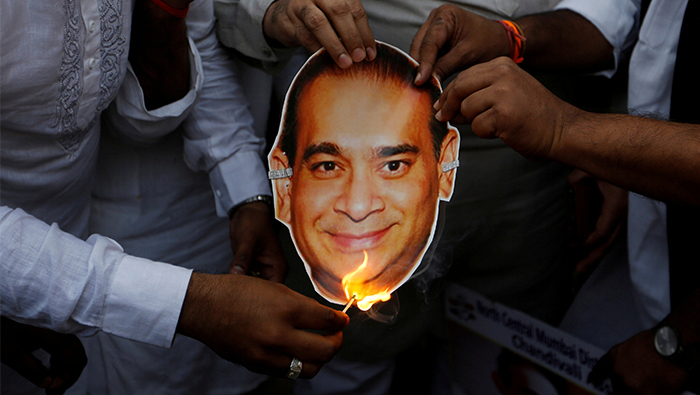
New Delhi: Potential buyers have expressed strong early interest in a bankrupt U.S. firm of Indian jeweller Nirav Modi, who has been accused of involvement in a $2 billion bank fraud in India, court filings show.
Firestar Diamond Inc filed for bankruptcy protection on February 26 in the United States, following accusations that other firms led by Modi and his uncle colluded with officials of state-run Punjab National Bank to secure unauthorised loans between 2011 and 2017, mostly from the overseas branches of Indian state banks.
Modi and his uncle Mehul Choksi, owner of Gitanjali Gems Ltd, left India in January before the fraud came to light, but have said in letters and statements they are innocent.
Indian investigators have, however, attached or seized assets belonging to Modi and his companies. Firestar is not named in the police complaint.
"Early expressions of interest in purchasing some or all of the debtors' business operations have been strong," Firestar Diamond said in a court filing on Wednesday.
It has also told secured lenders it was in discussions with lenders for debtor-in-possession financing as it weighed options.
Firestar Diamond and its affiliates had annual sales of around $90 million, with clients such as Costco Wholesale , Macy's and JC Penney Co Inc, it said.
India's Central Bureau of Investigation has arrested at least 13 people, seven from the bank and six from Modi and Choksi's companies. Investigators have also seized a number of properties from the two, including jewellery and luxury vehicles.
"Among the properties seized and businesses closed were factories in India which produced most of the fine jewellery merchandise sold by the debtors to their customers," Firestar said in its filing.
The Indian units had provided some back office and support functions, it said, adding, "The sudden loss of its supply chain and back office support has dramatically impacted the operations of the debtors in the short term."
Firestar Diamond was formed as a Delaware corporation in 2004 under the name Jewelry Solutions International. Its name was changed to Next Diamond Inc in 2005 and again in 2007 to Firestone Inc, before taking its current name in 2011.
The company is a wholly-owned subsidiary of Firestar Group, which in turn is wholly owned by Synergies Corp. Both are Delaware incorporated.
Synergies is then wholly owned by Firestar Holdings Ltd, a Hong Kong corporation, itself wholly owned by Modi's Indian company Firestar International Ltd, according to the filing in the United States Bankruptcy Court of the Southern District of New York.
Separately, an Indian agency that targets offences involving foreign exchange and money laundering said on Thursday it had seized 41 properties, worth about 12 billion rupees ($184.16 million), belonging to Choksi and companies he controls.
Among the properties are apartments and office spaces in key Indian cities, the agency, the Enforcement Directorate, added.
Bank consolidation
Stung by criticism of a slippage in the government's oversight of state-run banks, the finance ministry announced a flurry of measures, including setting banks a 15-day deadline to kick off action to improve risk oversight.
On Thursday the ministry said state-run banks would consolidate 35 overseas operations, with another 69 being considered for consolidation. The term operations covers bank branches, joint ventures, subsidiaries, remittance centres and representative offices.
Following the discovery of the alleged fraud, several bankers told Reuters there was a need to prune the overseas branches of state-run banks and rein in competition that sometimes leads to lax monitoring of transactions.
"PSBs to consolidate 35 overseas operations without affecting international presence of PSBs in these countries," Rajeev Kumar, the top civil servant in the financial services department said in a Twitter message, using an acronym for public-sector banks, as India describes its state-run banks.
He added, "Sixty-nine operations identified for further examination. Move towards cost efficiencies and synergies in overseas market," but did not name the banks or the affected operations.
The PSBs make up about 70 per cent of India's banking assets and held about 87 per cent of the banking system's 9.46 trillion rupees ($145 billion) of loans that are non-performing, restructured or rolled over, as of last September.